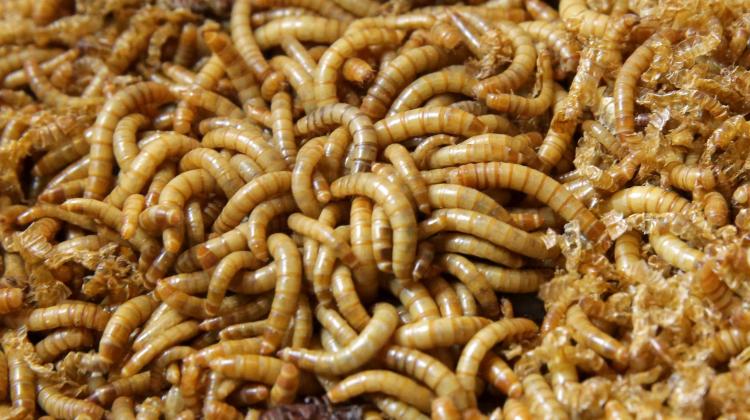Automatic robot to operate edible insect farm
 16.02.2021. Mealworm larvae. PAP/Tomasz Waszczuk
16.02.2021. Mealworm larvae. PAP/Tomasz Waszczuk
Scientists from the University of Warmia and Mazury (UWM) are working on a computer program for an autonomous robot to operate a farm that breeds insects for food purposes. The robot will assess the condition of insects and, among other things, their development phase.
The first edible insect farms are already being established in Poland.
Researchers from the UWM are conducting research aimed at developing a technology for the production of mealworm for fodder purposes. As part of the project co-financed by the National Centre for Research and Development, Dr. Piotr Zapotoczny, a professor at the Faculty of Technical Sciences of the University of Warmia and Mazury, is working on a computer program for an autonomous robot to operate the farm. The robot will autonomously move around the farm and perform all activities related to handling insects.
The robot will approach the shelf with drawers in the hall where insects are bred. Dr. Zapotoczny explained that “the robot will open a drawer to assess the condition of insects, i.e. the number of live and dead insects, their stage of development: whether they are larvae or pupae, it will assess whether they have food and distribute it if necessary, it will clean the drawer of faeces and chitin shells.”
He added that “faeces are a valuable fertilizer, and chitin shells that the larvae shed three to six times during their development are a valuable pharmaceutical raw material for dressings. If necessary, the robot will alert the farm staff.”
He continued: “I use machine learning. We feed the computer many images of insects, and it will use the machine learning algorithms we are working on to determine the essential features of the mealworm. On their basis, the robot will assess the condition and needs of insects in individual drawers.
“The robot does not get bored with work, does not get disgusted with insects, it does not demand payment.”
Human work will still be needed on an insect farm. Humans will prepare the feed and intervene in emergency situations. “But they will not have to stay in the hall, because all information about the breeding will be available in a mobile or computer application,” Zapotoczny said.
The grant, under which work on the robot's software is conducted, is intended to develop a technology for the production of mealworm for fodder purposes. It was awarded to the company Tenebria from Lubawa, a pioneer of breeding insects for fodder purposes in Poland, and the research manager is Professor Tadeusz Bakuła from the Faculty of Veterinary Medicine of the University of Warmia and Mazury. The project will continue until next year.
According to information on the university's website, “insect farms can be an alternative for those farmers who, for various reasons, have empty chicken coops or pigsties.” After adapting them, they can breed insects and earn money.
Last year, on a 36,000 broiler farm, scientists from the University of Warmia and Mazury studied the usefulness of protein from insects, namely mealworm and black fly, for feeding poultry in the framework of the 'Gospostrateg' project.
The manager of the 'Gospostrateg' project Professor Tadeusz Bakuła said that “the addition of insect protein is optimally 15 percent feed volume.
“With this amount, we found no differences in poultry breeding, growth and health. In addition, poultry meat, does not show any structure or taste differences compared to the meat of poultry fed with feeds based on soy or fish meal.”
PAP - Science in Poland
amk/ agt/ kap/
tr. RL
Przed dodaniem komentarza prosimy o zapoznanie z Regulaminem forum serwisu Nauka w Polsce.















